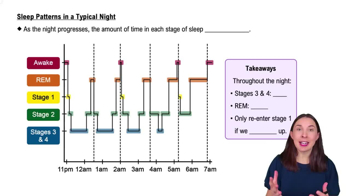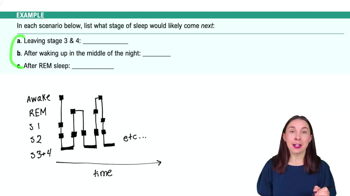Table of contents
- 1. Introduction to Psychology1h 43m
- 2. Psychology Research2h 20m
- 3. Biological Psychology2h 41m
- 4. Sensation and Perception28m
- 5. Consciousness and Sleep32m
- 6. Learning41m
- 7. Memory34m
- 8. Cognition37m
- 9. Emotion and Motivation35m
- 10. Developmental Psychology33m
- 11. Personality48m
- 12. Social Psychology41m
- 13. Stress and Health41m
- 14. Psychological Disorders44m
- 15. Treatment47m
5. Consciousness and Sleep
Sleep
Struggling with Psychology?
Join thousands of students who trust us to help them ace their exams!Watch the first videoMultiple Choice
True or False: if false, choose the answer that best corrects the statement.
Circadian rhythms describes the variation in body temperature.
A
True.
B
False; circadian rhythms describes the monthly hormonal cycle experienced by men.
C
False; circadian rhythms describes the 24-hour sleep-wake cycle.
D
False; circadian rhythms describes the daily changes in the ability to focus.
 Verified step by step guidance
Verified step by step guidance1
Understand the concept of circadian rhythms: Circadian rhythms are natural, internal processes that regulate the sleep-wake cycle and repeat roughly every 24 hours.
Identify the statement given: 'Circadian rhythms describes the variation in body temperature.'
Evaluate the statement: While circadian rhythms can influence body temperature, they primarily describe the 24-hour cycle of physiological processes, including the sleep-wake cycle.
Review the provided options: Determine which option correctly describes circadian rhythms.
Select the correct answer: 'False; circadian rhythms describes the 24-hour sleep-wake cycle.' This option accurately reflects the primary function of circadian rhythms.

 3:25m
3:25mWatch next
Master Circadian Rhythms with a bite sized video explanation from Hannah Gordils
Start learningRelated Videos
Related Practice


































































































![Race, Genes and IQ Differences | Bret Weinstein [Mini Clip]](https://img.youtube.com/vi/IztL_m3pd70/mqdefault.jpg)



































































































